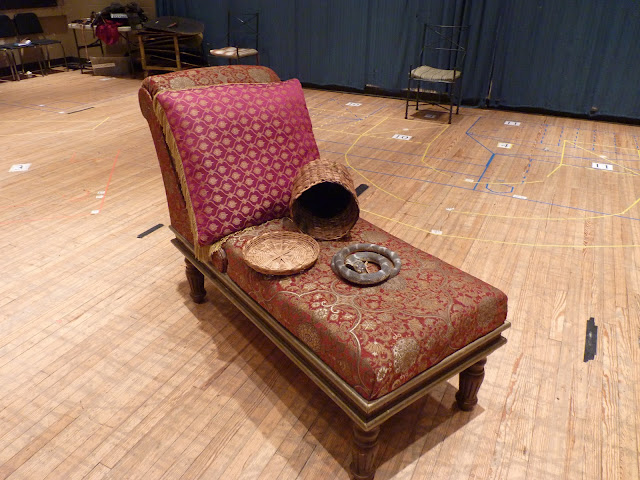Kiss’d Away Kingdoms
by Thomas
Canfield
Regarded primarily as a tragedy, Antony and Cleopatra is also a history
play and a sequel to Julius Caesar, another
tragic history that Shakespeare wrote several years earlier. Although Antony and Cleopatra begins where the first
play leaves off, it is quite different in construction, language, scope, and
themes. One of Shakespeare’s longest plays–over 25 percent longer than its
predecessor–Antony and Cleopatra belongs
to the period of the playwright’s great tragedies and is filled with rich, poetic
language. It also is remarkable for the forceful and enigmatic character of
Cleopatra. Extolled as Shakespeare’s greatest and most complex female creation,
she dominates the play even when absent from the immediate action.
An epic drama set on an international stage, Antony and Cleopatra encompasses an
ambitious historical and geographical scope. In it, Shakespeare chronicles–and
compresses–a series of events that took place over a ten-year period between
40-30 B.C.E., and the play’s 42 scenes often switch rapidly between several
far-flung Mediterranean settings. The story opens and concludes in Egypt, with
most of the action occurring in and around the exotic city of Alexandria, but we
also visit the marble halls of Rome, a villa in northern Sicily, and the deck
of a galley anchored off the Bay of Naples. Other locales include a battlefield
in Syria; the city of Athens; and the coast of Actium in northwest Greece.
There are 45 references to the “world” in this
play of global proportions, and as in most monumental epics, the plot begins in
the middle of the story. At the outset, Rome is ruled by the second
triumvirate, a political alliance that comprises Octavius Caesar, Mark Antony,
and Lepidus. Antony, commander of the eastern empire, has been residing in Egypt
with Cleopatra while neglecting his political and military responsibilities.
Reluctantly, he learns of a threefold conflict that requires his presence in
Rome. During Antony’s prolonged absence, his wife, Fulvia, and his brother have
waged civil war against Caesar. Although this conflict is now resolved with
Fulvia’s death, Antony owes Caesar an explanation. Meanwhile Pompey, a
rebellious Roman general, has raised an army in the Mediterranean and is
plotting a naval war against the triumvirate. On yet another front, Parthian
forces have invaded Syria.
Back
in Rome, Antony is reconciled with Caesar and their renewed accord is cemented with
Antony’s marriage to Octavia, Caesar’s sister. The three rulers of Rome forge a
temporary political alliance with Pompey, and the Parthian invasion is suppressed.
Antony’s new bride, however, cannot compete with the exotic allure and magnetism
of Cleopatra. When Antony makes the impetuous decision to return to Egypt, the ordinarily
cold and calculating Caesar is insulted and outraged at the disregard for
Octavia and their alliance.
Shakespeare
portrays Caesar as a determined man whose political destiny is to become sole
ruler of the Roman Empire. His unemotional, unerring trajectory towards power seems
fatalistic, which is one reason why Antony
and Cleopatra has been called a tragedy without a real villain. After
deposing Lepidus, Caesar breaks the alliance with Pompey and defeats him. In
the second half of the play, Caesar turns his attention squarely on Antony and
Cleopatra. They first clash at Actium, off the coast of Greece, where Antony ignores
his seasoned advisors and makes a reckless decision to engage Caesar’s forces at
sea. A second engagement on Egyptian soil results in initial success for Antony
and Cleopatra, but the inexorable tide of events soon turns against them.
Throughout
the play, Shakespeare represents the conflicts of the larger world in the antithesis
of individual characters. Rome, personified in Caesar, is a western civilization
that celebrates the masculine virtues of reason, duty, and order. War is the
stock and trade of this nation on the river Tiber. In contrast, Egypt, embodied
in Cleopatra, is a land of pleasure and excess. Centered on the Nile, this eastern
culture is ruled by the feminine qualities of love and passion. Cleopatra, its
queen, has been called Shakespeare’s most sensual female character.
One
of the most legendary love affairs in history, the tale of Antony and Cleopatra
has captivated audiences through the ages. In Shakespeare’s play, however, the
personal and private nature of their often-volatile relationship, marked by
extremes of emotion, is difficult to evaluate. These two mature lovers are
totally absorbed in each other, although we are unsure what truly unites them.
Except for one brief scene, they are never alone together on the stage so that
we can witness their unguarded, intimate sentiments. Antony is rash, hard
drinking, and self-indulgent, an emasculated shadow of the noble hero he was in
Julius Caesar. Cleopatra’s unpredictable
behavior, capricious moods, and unclear motives constantly shift and evolve throughout
the play.
The
last act, focused almost entirely on Cleopatra, proves beyond a doubt that she
is the play’s central character. Yet even in her final moments, it is difficult
to discern Cleopatra’s real motives and whether we should regard her death as a
shameful defeat or a triumphant victory. In the end, perhaps our sheer
uncertainty is the key to understanding Shakespeare’s Cleopatra and her enduring
mystique.



















